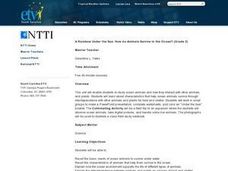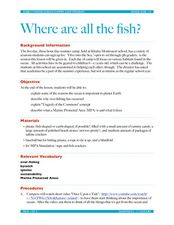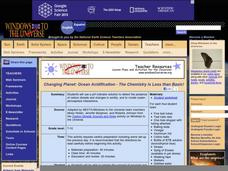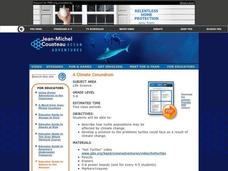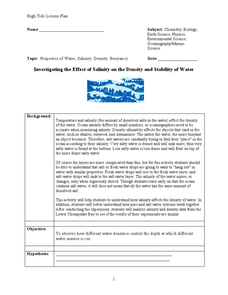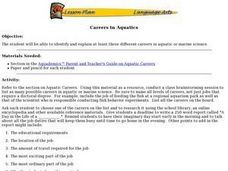Curated OER
A Rainbow Under the Sea: How do Animals Survive in the Ocean?
Second graders read books, watch videos, complete worksheets and participate in class discussions about ocean animals. They, in groups, design PowerPoint presentations on selected marine animals.
Curated OER
Where Are All the Fish?
Students identify the problems that marine life is facing today. In this marine science lesson, students explain how Marine Protected Areas can help the ocean and the fish. They brainstorm ways to help in the conservation effort.
Curated OER
Phytoplankton and Ocean Color
Fifth graders identify function of phytoplankton in the biospere by conducting experiments and simulations and reading for information. They detect the presence of phytoplankton in bodies of water by examining ocean in satellite images...
Curated OER
The Art and Science of Impressionist Color
Discover Impressionist painting as learners investigate the 19th century combinations of colors characteristically used. Students experiment with their own paintings, utilizing primary and secondary colors.
Curated OER
Marine Debris
Students will perform experiments to examine if debris will float, or blow in the wind. They discuss the effects of these characteristics on marine debris.
Curated OER
Marine Debris on the Chesapeake Bay
Students examine problem of litter and marine debris on the Chesapeake Bay, and experiment with density of marine debris.
University of Waikato
Ocean Acidification and Eggshells
Eggshells and seashells have a lot in common. Learners use the similarities to conduct an experiment that models the effect of ocean acidification on marine animals. Using varying levels of acidic liquids, pupils make observations on the...
Howard Hughes Medical Institute
Bacterial Quorum Sensing
The marine bacteria vibrio harveyi helps with DNA repair in humans. Understanding how to manipulate and genetically mutate this bacteria fascinates researchers. Young scientists observe two different mutations, predict the resulting...
NOAA
Journey to the Unknown
Go where no one has gone before. Learners experience what it is like to be a scientist exploring new territory. Using audio and a scripted text, pupils take a trip in the depths of the ocean. They follow their trip with a hands-on...
Curated OER
Changing Planet: Ocean Acidification - the Chemistry is Less than Basic!
A video and laboratory investigation are highlights to this lesson on acidification of ocean water due to increased atmospheric carbon dioxide. Using bromothymol blue (BTB) as an indicator, pupils analyze the amount of carbon dioxide...
Curated OER
Chilean Sea Bass
Introduce your mini-marine biologists to using databases. Tables of how many Chilean Sea Bass were caught and number of hours spent fishing are examined. Using the data, individuals calculate the "Catch per Unit of Effort" for each year....
Curated OER
A Climate Conundrum
After viewing a video and reading an article about the threatened turtles and tortises in The Amazon River area, collaborative groups create a poster or presentation about how we can help them. Several links to other related lesson plans...
Curated OER
Out of the Deep
Students observe, describe, and record characteristics of ocean animals (mammals and fish) and sea shells. They conduct an experiment comparing and contrasting sugar water, salt water and fresh water and create a mural of coral reef...
Curated OER
Something Fishy Going On
Students create a video animation of how Swimmy gathered his fish friends together to form a great big fish that would frighten the predator tuna away. In art class each child create a small red fish which gets displayed in the ocean...
Curated OER
Life Cycle: Diversity in a Balance
For this life cycle workbook, 3rd graders complete several different activities in which they analyze different invertebrates, identify arthropods, examine human biology and plants, and study natural environments. 20 different...
Curated OER
WET Science Lesson #11: How Light Affects Water
Scientists listen to the story of Wadja Egnankou who works to save African mangrove forests. They experiment with refraction and the introduction of particulate matter to water. They conclude with creative writing about the need for a...
Curated OER
What's in the Water?
Students examine how pollutants can affect ocean animals. In this pollution lesson plan, students read a story about the ocean floor, think about what would happen to the plants and animals if the ocean became dirty or polluted, and...
Curated OER
Investigating the Effect of Salinity on the Density and Stability of Water
Water with varying amounts of dissolved salt are dyed and then used to compare densities. The objective is to discover the effect of salinity, and therefore density, on ocean water on the stability of the ocean. Many branches of science...
Curated OER
The Wild Dolphin Project
Inspire young marine biologists to study animals in the wild with this assignment. Pupils view an eight-minute video and read an article in the New York Times about Denise Herzing's 25-year long study of dolphins in their own...
Curated OER
Towers of the Lost City
Middle school marine scientists compare the pH change in distilled and saltwater as acetic acid is added one drop at a time. Then they compare the pH change in both when sodium hydroxide is added. This experiment demonstrates the...
Curated OER
Coasts
Young scholars explain the different types of marine coasts and where they are located in the United States and its territories. They explain and identify some of the life forms that inhabit different marine coastal regions.
Curated OER
Careers in Aquatics
Students discuss careers related to aquatic or marine science. They write a report called "A Day in the Life of a (blank)." After reports are completed, if possible a person working in the field of aquatic or marine science is invited to...
Curated OER
Effects of Water Pollution on Aquatic Organisms
Learners investigate water pollution. They develop an understanding of the behavior of organisms, of the structure and properties of matter, and of natural and human induced hazards by conducting lab tests. They present their data...
Curated OER
Water Breathers
Students explore the effects of animal breathing and movement on water currents. In this aquatic animal lesson, students use food coloring to experiment and learn about water currents created by aquatic animals.


